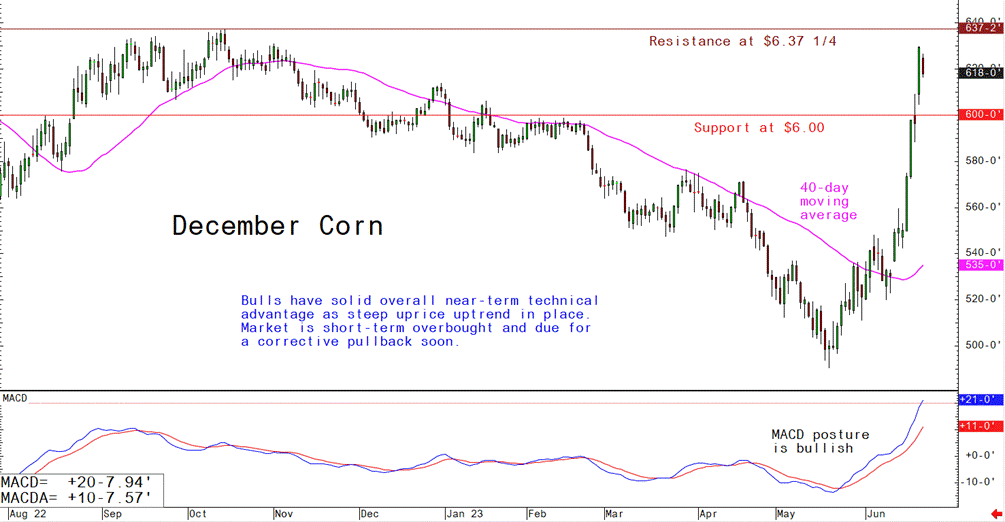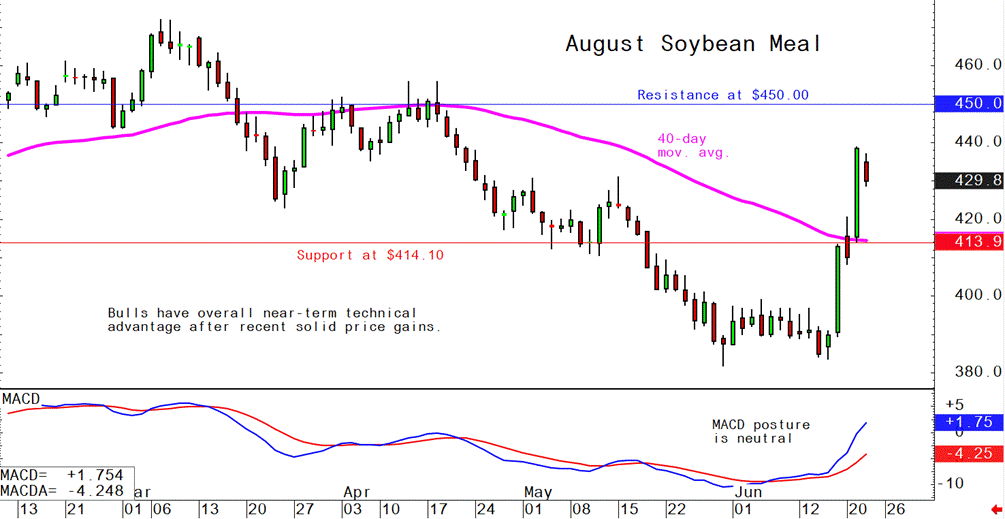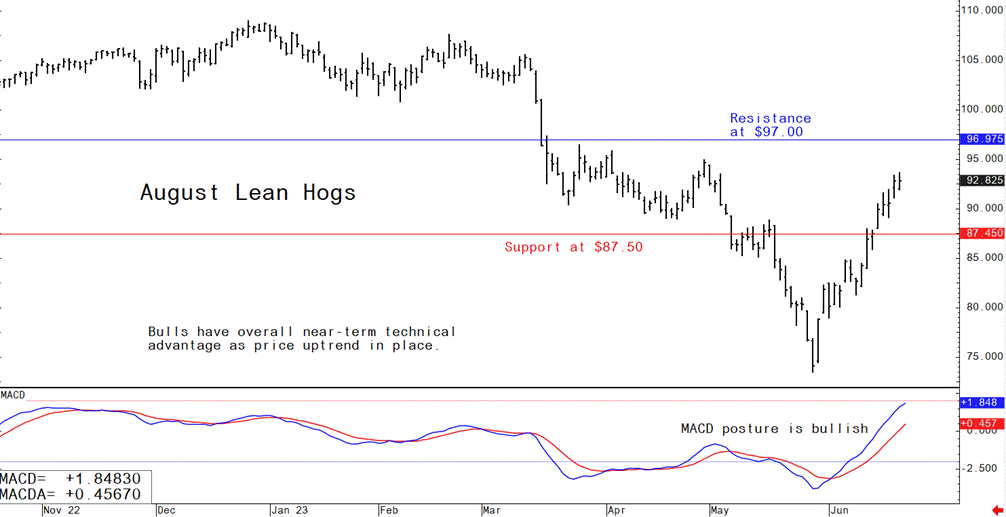



Pig outlook: Lean hog futures bulls keep price uptrend alive
Analyst Jim Wyckoff shares an update on the US futures market and global marketsLean hog futures prices hit a six-week high Wednesday and the bulls are enjoying a price uptrend in place on the daily bar chart. Rising cash hog and wholesale pork markets continue supporting lean hog futures. Lean hog futures price action Wednesday was impressive in the face of steep losses in the cattle futures markets and surge in corn and soybean meal futures prices. The latest official CME lean hog index for Monday was $88.75, up 54 cents from last Friday, while Tuesday’s preliminary calculation put the index at $89.62, up another 87 cents. Pork demand from grocers and consumers is improving in response to beef prices recently surging to their third highest level of all time. Pork demand also tends to climb as grilling season hits its stride between Memorial Day and Independence Day.
California postpones Prop 12 implementation date
California pushed back the implementation date for its Proposition 12 law by six months to Jan. 1, 2024. National Pork Producers Council CEO Bryan Humphreys said, “It is welcome news to America’s pig farmers and consumers that California recognized the challenging situation the July 1 Proposition 12 implementation date will have on our industry and food supply. Granting six months of additional relief for products in the supply chain allows grocery stores to remain stocked so the 40 million Californians have uninterrupted access to affordable, safe and nutritious pork products, especially with rising food prices... While this temporary solution does not solve the challenges and uncertainty California Proposition 12 brings to our industry, NPPC looks forward to working with Congress to find a permanent solution to this problem.”
Meat recall in US
Over 42,000 pounds of Johnsonville sausages have been recalled due to possible contamination with thin black plastic strands. The affected product is the brand's "Beddar With Cheddar" pork links. The USDA cautions that consumers might still have the recalled items in their refrigerators or freezers and advises against consumption. Instead, the product should be thrown away or returned to the place of purchase. The 14-oz. packages have a "best by" date of July 11, 2023, and were shipped to retailers in Colorado, Iowa, Kansas, Missouri, Nebraska, North Dakota, Oklahoma, and Texas.
Second-largest pork producing state in Mexico has concerns over California Proposition 12's impact
Sonora state in Mexico is worried about its pork exports to the U.S. This is because their swine production system doesn't align with the guidelines of the new California regulation. As an exporting state to Japan and the U.S., Sonora would be negatively affected economically because it provides approximately 10,000 tons of pork annually to the U.S. This equates to over $43 million in income and could be at risk due to Prop 12.
Support from state governors on legislation to override Prop 12
Republican governors from 11 states representing 54% of US pork production have shown support for the Exposing Agricultural Trade Suppression (EATS) Act, legislation that seeks to override California's Proposition 12. They claim that Prop 12 imposes expensive and unscientific requirements on pork producers, potentially leading to billions of dollars in additional expense. It remains unclear whether the EATS Act will garner enough support to become law, but finding a "must-pass" legislative vehicle could be key.
Meanwhile, Kitty Block, president and CEO of the Humane Society of the United States, said: “The EATS Act presents a shocking threat to animals, consumers, workers, the environment and states’ rights.”
Sara Amundson, president of Humane Society Legislative Fund said, “It’s not California that’s trying to foist its standards on the rest of the country. It’s the pork industry’s trade association that’s trying to force every state to accept the terms of any other state that chooses not to ensure humane treatment, food safety, environmental rules, child labor protection or other standards.
Says one observer: “If they can’t see the irony in these statements, there’s not much hope of a conversation with these people."
US Senate panel advances bill for new feed additive category
The Senate Committee on Health, Education, Labor and Pensions this week advanced a bill that would establish a new pathway at the U.S. Food and Drug Administration (FDA) for novel feed additives to increase livestock efficiency and production. The Innovative Feed Enhancement and Economic Development (FEED) Act of 2023 (S1842) by the Senate Committee on Health, Education, Labor and Pensions aims to establish a new pathway at the U.S. Food and Drug Administration (FDA) for novel feed additives that increase livestock efficiency and production.
The FEED Act sets out to modernize the Federal Food, Drug, and Cosmetic Act, paving the way for innovative products to reach the market and advance improvements in food safety. The National Grain and Feed Association (NGFA) has expressed strong support for this bill, highlighting its potential to promote products with novel benefits, such as environmental improvements and reduced human foodborne illness.
The lawmakers who introduced the bill cite examples from Europe, Asia, and South America where feed products have demonstrated increased efficiency in meat production, as well as byproduct and waste reduction. The FDA has also acknowledged that some animal food products do not fit clearly within its existing categories and could use updated regulations.
The Innovative FEED Act would allow products with substantiated claims to be approved as feed additives, offering a more efficient and predictable process compared to the current system that classifies them as animal drugs. To ensure that this new pathway is safe and effective, the bill also establishes guardrails for product eligibility.
California Prop 12 Updates
In response to California’s Proposition 12, Sen. Roger Marshall (R-Kan.) is introducing the Ending Agricultural Trade Suppression (EATS) Act today. This bill aims to prevent states from enacting laws that impact agricultural production in other states. The law has attracted co-sponsors including Republican Senators Chuck Grassley, Joni Ernst, John Cornyn, Tom Cotton, Deb Fischer, Kevin Cramer, Eric Schmitt, and Ted Budd. The EATS Act seeks to preserve states' rights by limiting their ability to impose agricultural regulations on other states.
Proposition 12 requires pork sold in the state to be produced under specific conditions, which has caused concerns for pork-producing states, with potential nationwide implications on food costs and producers' ability to comply. Proponents of the EATS Act argue that such regulations unfairly burden other states and their agricultural industries, while opponents claim that the Act would undermine states' rights and give multinational conglomerates an unfair advantage.
Despite the support for the EATS Act, some believe that the bill is unlikely to pass Congress, as some food companies and retailers are already advocating for better living conditions for animals. The pork industry itself is divided, with several companies having adopted the California standards and reducing the use of gestation crates. The National Pork Producers Council and other agricultural organizations have supported the EATS Act, hoping to protect farmers and ranchers from burdensome regulations.
USDA is considering implementing higher standards for meat products marketed as "humanely raised" or antibiotic-free. This effort aims to respond to criticism that these claims are often exaggerated to justify higher prices. USDA's Food Safety and Inspection Service (FSIS) is under pressure to tighten oversight of marketing claims on packaged food, as consumers often pay a premium for such products based on perceived benefits such as health, environmental impact, or animal welfare.
Recent studies from animal welfare groups and science journals reveal that the USDA's rules for allowing such claims may be too lax. A report from the Animal Welfare Institute found that the USDA could not substantiate animal-raising claims on many meat products that carried related labels. Similar investigations found issues with incomplete or inaccurate label applications and antibiotics in meat that was labeled antibiotic-free.
In response, USDA wants to reduce fraudulent claims and plans to revise guidelines for companies providing documentation about animal-raising claims. They are strongly encouraging the use of third-party certification to verify these claims. Additionally, the FSIS and USDA's Agricultural Research Service plan to assess antibiotic residues in cattle and revise labeling requirements based on the results.
California Proposition 12 update (based on several sources):
- Proposition 12 has led to significant changes in the pig production industry. U.S. producers are currently losing around $40 per pig, while Ukrainian producers are making a profit of $100 per head, making their country possibly the most profitable for hog production globally.
- Strict enforcement of Prop 12 isn't occurring at the moment, and pork already in the pipeline won't face penalties. However, starting Jan 1, 2024, third-party inspection and certifications will be required, along with yearly renewals. Distributors must register with the CDFA by July 1, 2023.
- As a result of Prop 12, only 8% of U.S. sow housing can currently meet the new standard, which is inadequate to fulfill California's pork demand. Producers have identified a decrease in conception rates on compliant farms as a major issue, with one solution being to double the amount of food provided to sows during the first 30 days of gestation, but this comes with added expense.
- Major processors believe they will gradually meet California's pork demand, which is approximately 13% of total U.S. pork consumption. However, the types of pork products consumed in the state, such as bacon and ribs, might shift towards more hams and loins.
The next week’s likely high-low price trading ranges:
August lean hog futures--$88.00 to $97.50 and with a sideways-higher bias
August soybean meal futures--$415.00 to $450.00, and with a sideways-higher bias
December corn futures--$5.90 to $6.50 and a sideways-higher bias
Latest analytical daily charts lean hog, soybean meal and corn futures












